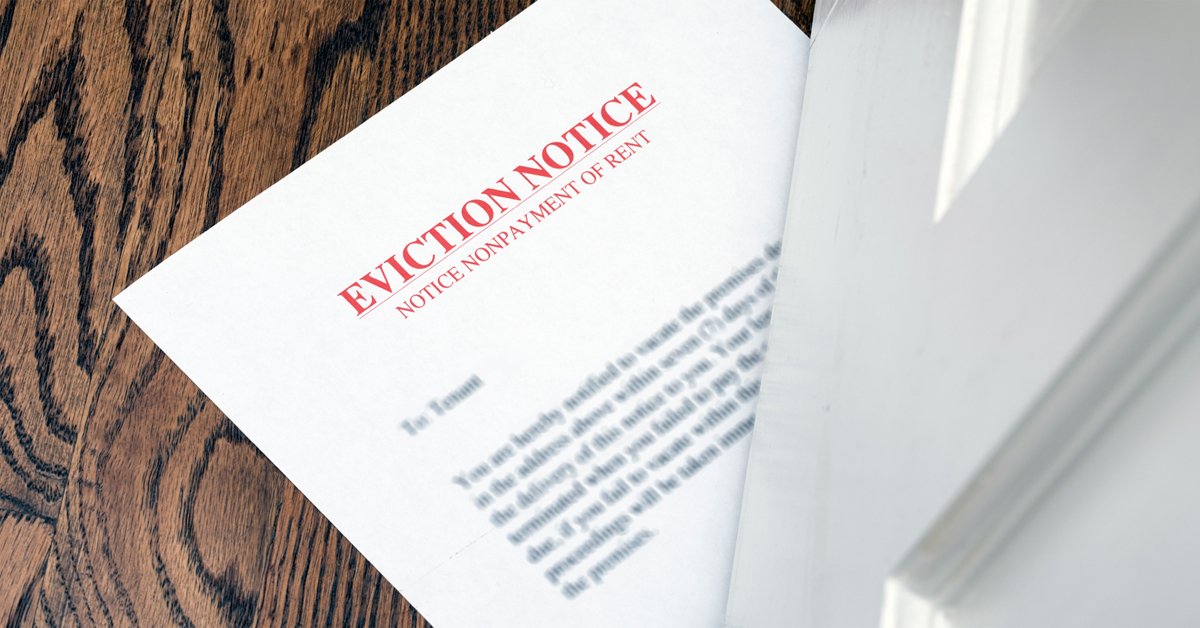
A bankruptcy or consumer proposal provides an automatic stay of proceeding that can stop an eviction order from your landlord for rent arrears. Specifically, subsection 84.2(1) of the Bankruptcy & Insolvency Act says you can’t terminate a contract due to bankruptcy (which is why you can keep paying for your secured car loan when you go bankrupt) and subsection 84.2(2) says you can’t terminate a lease due to unpaid rent prior to bankruptcy (and the case law specifically refers to families having the ability to maintain some stability while trying to get a fresh start).
The rules are similar in a proposal; the relevant sections are 66.34(1) and 66.34(2).
Unpaid rent, up to the date of filing, is included as a debt discharged by bankruptcy or forgiven in your proposal.
Table of Contents
Eviction process
A landlord must follow specific steps to evict a tenant. Landlord and tenant issues are legislated provincially. In Ontario, these procedures are set out in the Residential Tenancies Act (RTA).
Your landlord will first issue a notice of termination of tenancy, stating the reason for eviction. For rent arrears, your landlord must provide 14 days’ notice if you pay rent monthly.
Your landlord will then apply to the Landlord and Tenant Board for an eviction order. You will receive a Notice of Hearing at which they will review the application. The board may then issue a notice to pay rent arrears or vacate by a specific date.
If you fail to vacate, the Sheriff may also issue a notice to vacate.
Stay of proceeding
Since it is federal legislation, the Bankruptcy & Insolvency Act (BIA) supersedes or overrules provincial legislation about landlords and tenants. That means that the stay of proceedings provided by the BIA is effective against the landlord if you file a personal bankruptcy or consumer proposal.
Once you file, the landlord can no longer evict you for rent arrears owing up to the date of filing. Rent arrears can be included in your bankruptcy or proposal. The stay also stops any eviction order from the tribunal or board and any notice to vacate issued by the Sheriff.
Can I stay in my rental unit after filing bankruptcy?
You can choose to stay in the property after filing. This will be a personal and financial decision you need to make. If you stay, you may find you have a difficult on-going relationship with your landlord. However, moving can require the accumulation of first and last months’ rent which can be difficult immediately after filing. There are also issues to be considered if you are responsible for your own utilities. Always talk to your trustee about your specific situation for advice on what might be best for you.
If you choose to remain in tenancy after bankruptcy, you must be prepared to pay a per Diem for the remainder of the month post-filing and remain current on your rent after bankruptcy. Rents paid after filing can be directed applied to current rent only.
If you fail to pay current rent, your landlord can issue a new notice for non-payment of rent from the date of bankruptcy and begin the eviction process over.
Will this deal with a renoviction?
Another common occurrence we have seen, particularly in cities with rising real estate prices like Toronto, is what is commonly known as a renoviction. Your landlord can request eviction if they want to tear down the building, use it for something else, do significant renovations (after which they will increase the rent), or wish to sell or use the property for themselves or a family member. Filing insolvency will not stop an eviction for these reasons. We are, however, seeing a rise in people filing insolvency to deal with other unsecured debt to improve their financial situation to be able to absorb the monetary shock such an eviction can cause.
Landlord responsibilities in bankruptcy
When a tenant declares bankruptcy or files a proposal, the trustee will notify the landlord as a creditor if you are in arrears with your rent. If you are not in arrears, your landlord is not notified.
Your landlord can file a proof of claim for any arrears owing up to the date of filing. As with any creditor, your landlord can also request a creditors’ meeting.
With the increasing cost of rent in most major cities in Ontario, we are seeing an increasing number of clients who, in addition to carrying other debts, fall behind on their rent. We do not generally recommend filing bankruptcy solely to deal with rent arrears. As mentioned, this can create a difficult relationship with your landlord and is a one-time solution only. If, however, you have fallen behind on your rent due to other debt payments, dealing with all creditor arrears through a bankruptcy or consumer proposal can be a way to improve your cash flow so you can stay current on your rent moving forward.






